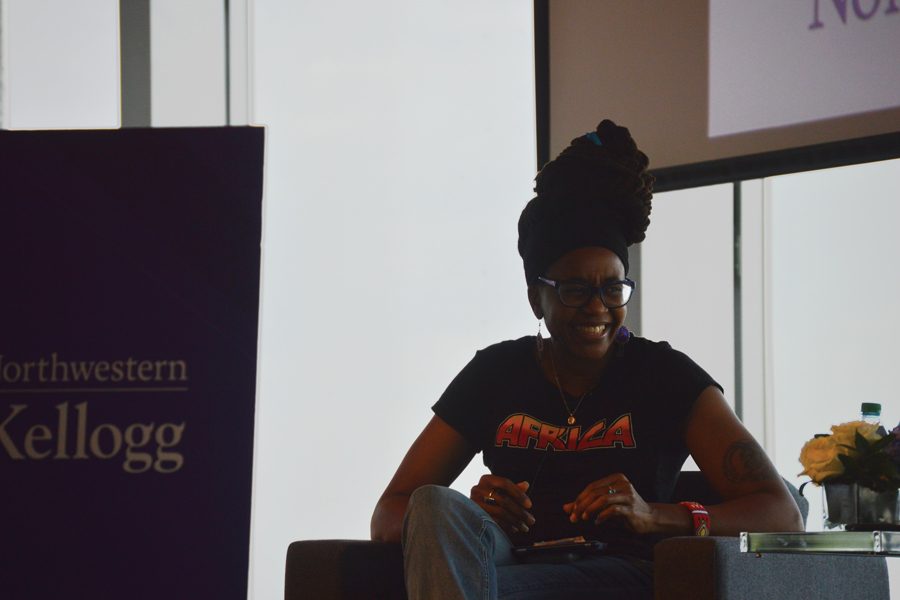‘Black Panther’ comics writer Nnedi Okorafor speaks at Africa Business Club event
May 10, 2018
Nnedi Okorafor has some issues with Wakanda.
“One of my issues with Wakanda is Wakandans — I don’t feel like we see enough of them,” she said Thursday at the Kellogg School of Management Global Hub. “The storyline is always focusing on royalty, or people involved higher up.”
The award-winning author had this concern, among others, when Marvel approached her to co-write the “Black Panther” comic series. After two weeks of consideration, she said she reluctantly accepted the offer, hoping to address the issues as an insider.
Speaking during a moderated interview with English Prof. Chris Abani, Okorafor discussed her work in Afrofuturism, which she describes as African-based science fiction.
Okorafor said when people first called her work Afrofuturism, she rejected the term because she understood it as having roots in the U.S., whereas her stories focus on the experiences of people in Africa. Since then, though, she has redefined the term to apply to her own writing.
That amendment is “problematic” and hasn’t gone without controversy, she admitted — some have said it excludes work centered on African American experiences — but she said her definition connects the African diaspora through the past, present and future.
Thursday’s event, hosted by the Africa Business Club, aimed to educate the Kellogg community about African culture and economics, part of the overall goal of the group’s Africa Week. First-year Kellogg student Ehis Akhetuamhen, co-president of the group, said they invited Okorafor to discuss a topic that focuses on the future of Africa.
“This year we wanted to create a program that’s open to not just Kellogg,” he said. “We wanted to do a topic that would interest the broader Northwestern community. One of our goals is to integrate and collaborate more with the NU community.”
Okorafor, born in the U.S. to Nigerian immigrant parents, began writing after receiving spinal surgery at 19. As a child, she was a dedicated athlete, indulging in track and field and semi-professional tennis, she said.
But when she became temporarily paralyzed, Okorafor said she began to focus on her creativity after her physical abilities were “abruptly” and “unexpectedly” gone.
“I had this moment of mortality, this moment where I became very aware of my mortality,” she said. “My sense of reality and the way that I viewed the world was different.”
As a child splitting time between continents, Okorafor said she dealt with racism and identity frequently. In the U.S., African Americans called her “white,” while in Nigeria, people said she looked different and disapproved of her lack of proficiency in the native language, Okorafor said. She also faced racism and bigotry, often being called racial slurs by passersby, she said.
Asked if this disrupts her work, however, she responded: “Nothing disrupts my work.”
McCormick junior Seyi Adedoyin, who attended the event, said though she already had an interest in Afrofuturism, Okorafor’s talk motivated her to dive deeper into the genre. She called Okorafor “inspiring” and “brilliant,” and also echoed her comments on Wakanda.
“You don’t learn a lot about America from the presidency,” she said. “(Not) as much as you learn from Americans.”
Email: [email protected]
Twitter: @_perezalan_


